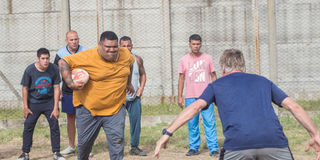Argentina inmates play rugby in bid to ditch life of crime

Actors take part in the filming of a scene of the series "Spartans", in the Penal Unit No. 48, in San Martin, on the outskirts of Buenos Aires, Argentina, December 1, 2022. Today rugby is played in 44 prisons in Argen
What you need to know:
- Oderigo, who also founded a women's prison rugby team and later the Espartanos Foundation, discovered that the controlled aggression and team-focused nature of rugby helped reduce the levels of violence in prisons after matches. The scheme also helped prisoners later reintegrate into society.
Buenos Aires
Argentine criminal clerk and former rugby player Eduardo "Coco" Oderigo wanted to find a way to help inmates rehabilitate and stay out of jail once released, so he combined his two passions: the law and his knowledge of the sport.
The plan faced challenges including convincing skeptical prison directors to let hardened criminals scrum and tackle in a physical contact game, but it worked. Prisoners who played in the teams had a re-offending rate of 5%, far below the average in the Argentine prison system of 65%. Fewer returned to jail.
"In reality, it's not just that the re-offending rate comes down to 5%, but also you have a countless number of people who don't become victims when these people are released," Oderigo told Reuters.
His journey has been turned into "Spartans: A True Story," a Disney+ series premiering on Wednesday, a reference to the name of the first prison team he put together, the Espartanos.
The first match took place 16 years ago in Penal Unit number 48 of San Martin, on the outskirts of Buenos Aires. Today rugby is played in 44 prisons in Argentina. Oderigo also helps link prisoners up with education tools and potential jobs.
"In prison, every obstacle is there from the first locked door," Oderigo said. "The truth is that I had something that I was passionate about, which was sport."
Oderigo, who also founded a women's prison rugby team and later the Espartanos Foundation, discovered that the controlled aggression and team-focused nature of rugby helped reduce the levels of violence in prisons after matches. The scheme also helped prisoners later reintegrate into society.
The Spartans received visits from the England and New Zealand rugby teams, who wanted to learn about the project. The "All Blacks" even did their traditional haka, the dance they perform before each match, in the prison.


